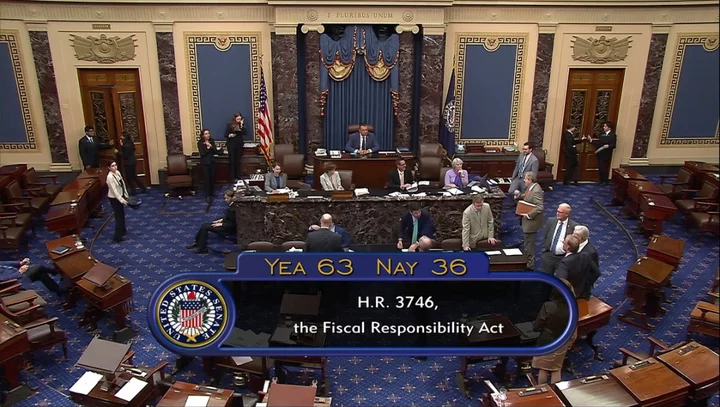
Debt ceiling news - live: Senate passes debt limit deal bill sending it to White House for Biden signature
The Senate has passed a bipartisan agreement forged by US president Joe Biden and House speaker Kevin McCarthy to raise the $31.4 trillion US debt ceiling after the deal survived a Republican rebellion in the House of Representatives. The Fiscal Responsibility Act, which will also implement new federal spending cuts, cleared the lower chamber with 314 votes in favour and 117 against on Wednesday night. The narrowness of its passage through the House was made possible through the support of Democrats, who stepped in to thwart a Republican rebellion that badly undermined Speaker McCarthy’s claims to control over his increasingly divided party. On Thursday, the Senate rejected 11 proposed amendments before passing the bill 63 for to 36 against. Senate majority leader Chuck Schumer will now send the bill to President Biden’s desk for his signature. Full congressional approval was required before Monday 5 June, when the Treasury Department was expected to run out of funds to pay its debts for the first time in American history. Read More Underestimated McCarthy emerges from debt deal empowered as speaker, still threatened by far right Lauren Boebert didn’t turn up to vote on debt ceiling deal she furiously campaigned against What’s next for Biden-McCarthy debt ceiling deal as Senate races to beat default deadline?
2023-06-02 16:22
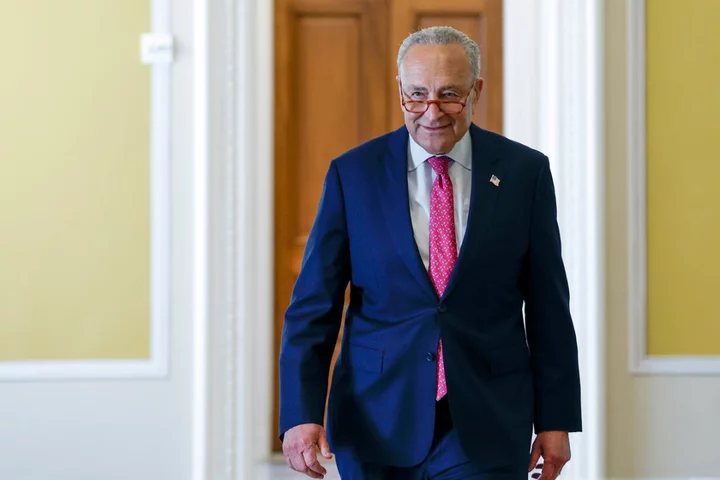
Senate passes debt limit bill after marathon 11 amendment votes to avoid default
The Senate voted late on Thursday night to raise the debt limit and avoid allowing the United States to default on its debt for the first time in history after having an all-night marathon session of votes to assuage Republican concerns. The legislation passed 63 to 36 after senators held 11 votes on amendments —10 from Republicans and 1 from Democrats — to address concerns about the bill. All but five Senators in the Democratic caucus--Sens Bernie Sanders (I-VT), Elizabeth Warren (D-MA), Ed Markey (D-MA), John Fetterman (D-PA) and Jeff Merkley (D-OR)--voted for the legislation while 31 Republican Senators opposed it. “America can breathe a sigh of relief because in this process we are avoiding,” Senate Majority Leader Chuck Schumer said before the votes began on Thursday evening. The vote came after the House passed the legislation on Wednesday that was the result of bipartisan negotiations between the House and the White House. The bill will now head to President before 5 June, the date that Treasury Secretary Janet Yellen had warned that the United States would default on its debt. Republicans raised concerns about some of the restraints on defence spending, which is capped at $886bn. “Well, my message is, I'm a Reagan Republican,” Sen Lindsey Graham (R-SC) told The Independent. “And you do military budgets based on threats and you want to fight over the role of the Republican Party on national defence, I welcome the fight.” Mr Graham expressed concern that it would lead to the United States not being able to support Ukraine in its war against Russia. “And if you want to avoid conflict, you better stand up to aggression,” he said. Sen Susan Collins (R-ME) echoed those concerns in a floor speech. “It would trigger an automatic meat an indiscriminate across-the-board cut in our already inadequate defence budget and in the domestic discretionary non-defence funding,” Sen Susan Collins (R-ME) said in a floor speech. “This would happen automatically if in fact all 12 appropriations bills have not been passed.” Ms Collins said that such a problem could be remedied through a defence supplemental package, which other Senators have also discussed. “It was important for some of our members to have folks on the record, acknowledging that there clearly could be a need will be a need for additional assistance for our national security interests,” Senate Minority Whip John Thune (R-SD) told The Independent. But some Republicans said they still opposed the debt limit increase. “Trade deficit with China,” Sen Josh Hawley (R-MO) told The Independent about why he opposed the bill. “Not gonna do anything about it.” Before the votes began, the Senate went into overtime with negotiations, with Sen Kyrsten Sinema (I-AZ) serving as an intermediary between Democrats and Republicans. “The President took too long but he had his own process and we got to save the country from having to fall,” Sen Mitt Romney (R-UT) told The Independent. “Speaker McCarthy has been underestimated and he's proven that he could get something done.” Conversely, Sen Tim Kaine (D-VA) proposed an amendment to strike a provision to expedite the completion of the Mountain Valley Pipeline, a natural gas pipeline that spans from West Virginia to Virginia, that ultimately failed 30 to 69. The pipeline is a top priority for Sen Joe Manchin (D-WV). Mr Manchin celebrated the inclusion of the pipeline in the agreement. “It’s important for our country, very much important,” Mr Manchin told The Independent. The approval of the pipeline triggered Sen Ed Markey (D-MA), an outspoken advocate for combating climate change, from opposing the legislation. But Sen Brian Schatz (D-HI), another climate hawk, said he would vote for it. “The agreement is the agreement we're going to have to vote for it,” he told The Independent. Other Democrats criticised the fact the bill imposed work requirements for the Supplemental Nutrition Assistance Program, known as SNAP and formerly called food stamps, for adults between the ages of 50 and 54 who do not have children and do not have disabilities. “I did not agree to these SNAP restrictions, and I won’t give Republicans an opening to try and take food from more food insecure Americans in Farm Bill negotiations later this year,” Mr Fetterman said in a statement after the vote. “As I communicated to leadership and the White House, I would have voted to avoid default if it would have made the difference. All in all, this was a tough vote and an ugly situation manufactured by extortionists. While we avoided a catastrophe this time around, we should never put the country in this situation again.” Mr Fetterman said Mr Biden should have invoked the 14th amendment to the US Constitution to avoid a default on the nation’s debt. The vote signals the end to a drawn-out fight between the Republican-controlled House on one end and a Democratic-controlled Senate and the White House on the other. Mr Schumer said the quick passage of the legislation showed the willingness to the Senate to avoid a catastrophic default. Read More 'Shrink the room:' How Biden and McCarthy struck a debt-limit deal and staved off a catastrophe Underestimated McCarthy emerges from debt deal empowered as speaker, still threatened by far right Biden and McCarthy’s debt limit deal went through – but there are winners and losers 'Shrink the room:' How Biden and McCarthy struck a debt-limit deal and staved off a catastrophe Biden and McCarthy’s debt limit deal went through – but there are winners and losers What’s next for Biden-McCarthy debt limit deal as Senate races to beat default?
2023-06-02 11:29

American Airlines' reliance on partners faces test after court ruling
By Rajesh Kumar Singh CHICAGO American Airlines' plan to grow revenue by relying more heavily on alliance partners
2023-06-02 02:56
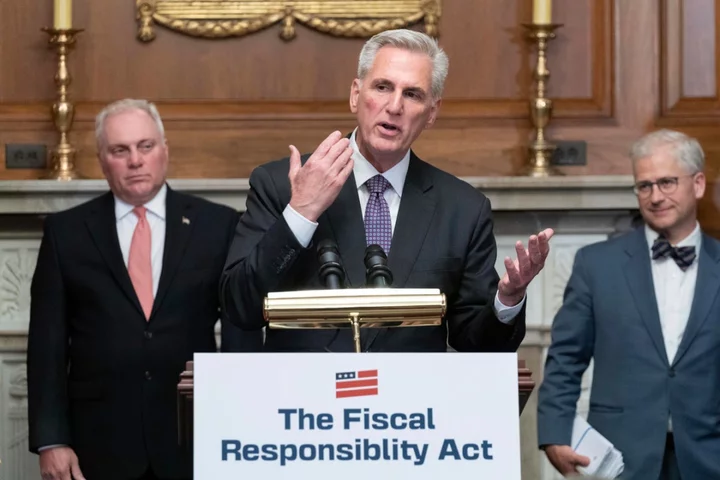
After sailing though House on bipartisan vote, Biden-McCarthy debt ceiling deal now goes to Senate
Veering away from a default crisis, the House overwhelmingly approved a debt ceiling and budget cuts package, sending the deal that President Joe Biden and Speaker Kevin McCarthy negotiated to the Senate for swift passage in a matter of days, before a fast-approaching deadline. The hard-fought compromise pleased few, but lawmakers assessed it was better than the alternative — a devastating economic upheaval if Congress failed to act. Tensions ran high as hard-right Republicans refused the deal, but Biden and McCarthy assembled a bipartisan coalition to push to passage on a robust 314-117 vote late Wednesday. “We did pretty dang good,” McCarthy, R-Calif., said afterward. Amid deep discontent from Republicans who said the spending restrictions did not go far enough, McCarthy said it is only a “first step." Biden, watching the tally from Colorado Springs where Thursday he is scheduled to deliver the commencement address at the U.S. Air Force Academy, phoned McCarthy and the other congressional leaders after the vote. In a statement, he called the outcome “good news for the American people and the American economy.” Washington is rushing after a long slog of debate to wrap up work on the package to ensure the government can keep paying its bills, and prevent financial upheaval at home and abroad. Next Monday is when the Treasury has said the U.S. would run short of money and risk a dangerous default. Biden had been calling lawmakers directly to shore up backing. McCarthy worked to sell skeptical fellow Republicans, even fending off challenges to his leadership, in the rush to avert a potentially disastrous U.S. default. A similar bipartisan effort from Democrats and Republicans will be needed in the Senate to overcome objections. Overall, the 99-page bill would make some inroads in curbing the nation’s deficits as Republicans demanded, without rolling back Trump-era tax breaks as Biden wanted. To pass it, Biden and McCarthy counted on support from the political center, a rarity in divided Washington. A compromise, the package restricts spending for the next two years, suspends the debt ceiling into January 2025 and changes some policies, including imposing new work requirements for older Americans receiving food aid and greenlighting an Appalachian natural gas line that many Democrats oppose. It bolsters funds for defense and veterans, and guts new money for Internal Revenue Service agents. Raising the nation's debt limit, now $31 trillion, ensures Treasury can borrow to pay already incurred U.S. debts. Top GOP deal negotiator Rep. Garret Graves of Louisiana said Republicans were fighting for budget cuts after the past years of extra spending, first during the COVID-19 crisis and later with Biden's Inflation Reduction Act, with its historic investment to fight climate change paid for with revenues elsewhere. But Republican Rep. Chip Roy, a member of the Freedom Caucus helping to lead the opposition, said, “My beef is that you cut a deal that shouldn’t have been cut.” For weeks negotiators labored late into the night to strike the deal with the White House, and for days McCarthy has worked to build support among skeptics. At one point, aides wheeled in pizza at the Capitol the night before the vote as he walked Republicans through the details, fielded questions and encouraged them not to lose sight of the bill’s budget savings. The speaker has faced a tough crowd. Cheered on by conservative senators and outside groups, the hard-right House Freedom Caucus lambasted the compromise as falling well short of the needed spending cuts, and they vowed to try to halt passage. A much larger conservative faction, the Republican Study Committee, declined to take a position. Even rank-and-file centrist conservatives were unsure, leaving McCarthy searching for votes from his slim Republican majority. Ominously, the conservatives warned of possibly trying to oust McCarthy over the compromise. One influential Republican, former President Donald Trump, held his fire: "It is what it is,” he said of the deal in an interview with Iowa radio host Simon Conway. House Democratic leader Hakeem Jeffries said it was up to McCarthy to turn out Republican votes in the 435-member chamber, where 218 votes are needed for approval. As the tally faltered on an afternoon procedural vote, Jeffries stood silently and raised his green voting card, signaling that the Democrats would fill in the gap to ensure passage. They did, advancing the bill that hard-right Republicans, many from the Freedom Caucus, refused to back. “Once again, House Democrats to the rescue to avoid a dangerous default,” said Jeffries, D-N.Y. “What does that say about this extreme MAGA Republican majority?” he said about the party aligned with Trump’s ”Make America Great Again” political movement. Then, on the final vote hours later, Democrats again ensured passage, leading the tally as 71 Republicans bucked their majority and voted against it. The nonpartisan Congressional Budget Office said the spending restrictions in the package would reduce deficits by $1.5 trillion over the decade, a top goal for the Republicans trying to curb the debt load. In a surprise that complicated Republicans' support, however, the CBO said their drive to impose work requirements on older Americans receiving food stamps would end up boosting spending by $2.1 billion over the time period. That's because the final deal exempts veterans and homeless people, expanding the food stamp rolls by 78,000 people monthly, the CBO said. Liberal discontent, though, ran strong as nearly four dozen Democrats also broke away, decrying the new work requirements for older Americans, those 50-54, in the food aid program. Some Democrats were also incensed that the White House negotiated into the deal changes to the landmark National Environmental Policy Act and approval of the controversial Mountain Valley Pipeline natural gas project. The energy development is important to Sen. Joe Manchin, D-W.Va., but many others oppose it as unhelpful in fighting climate change. On Wall Street, stock prices were down Wednesday. In the Senate, Democratic Majority Leader Chuck Schumer and Senate Republican leader Mitch McConnell are working for passage by week's end. Schumer warned there is ”no room for error." Senators, who have remained largely on the sidelines during much of the negotiations, are insisting on amendments to reshape the package. But making any changes at this stage seemed unlikely with so little time to spare before Monday's deadline. ___ AP White House Correspondent Zeke Miller, AP writers Mary Clare Jalonick, Seung Min Kim and Jill Colvin and video journalist Nathan Ellgren contributed to this report. Read More Ukraine war’s heaviest fight rages in east - follow live Charity boss speaks out over ‘traumatic’ encounter with royal aide Debt ceiling deal advances pipeline and tweaks environmental rules. But more work remains. Republicans get their IRS cuts; Democrats say they expect little near-term impact Progressives and conservatives complain as Biden-McCarthy debt deal passes
2023-06-01 12:56

American Airlines to appeal JetBlue alliance court ruling -CEO
WASHINGTON American Airlines Group will appeal a U.S. court decision requiring it to end an alliance with JetBlue
2023-06-01 05:26

American Airlines raises Q2 profit outlook on lower fuel costs
American Airlines Group on Wednesday raised its outlook for second-quarter profit as it expects to pay lesser for
2023-05-31 19:53
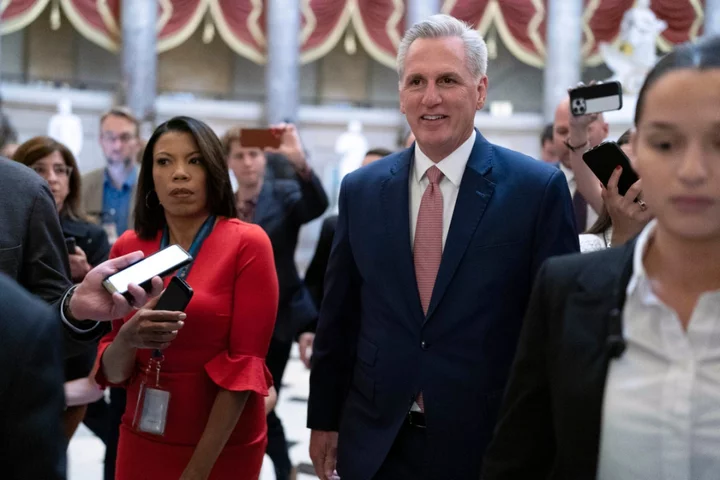
Ahead of House debt ceiling vote, Biden shores up Democrats and McCarthy scrambles for GOP support
Hard-fought to the end, the debt ceiling and budget cuts package is heading toward a crucial U.S. House vote as President Joe Biden and Speaker Kevin McCarthy assemble a coalition of centrist Democrats and Republicans to push it to passage over fierce blowback from conservatives and some progressive dissent. Biden is sending top White House officials to meet early Wednesday at the Capitol to shore up support ahead of voting. McCarthy is working furiously to sell skeptical fellow Republicans, even fending off challenges to his leadership, in the rush to avert a potentially disastrous U.S. default. Despite deep disappointment from right-flank Republicans that the compromise falls short of the spending cuts they demanded, McCarthy insisted he would have the votes needed to ensure approval. “We’re going to pass the bill,” McCarthy said as he exited a lengthy late Tuesday night meeting at the Capitol. Quick approval by the House and later in the week the Senate would ensure government checks will continue to go out to Social Security recipients, veterans and others, and prevent financial upheaval at home and abroad. Next Monday is when Treasury has said the U.S. would run short of money to pay its debts, risking an economically dangerous default. The package leaves few lawmakers fully satisfied, but Biden and McCarthy are counting on pulling majority support from the political center, a rarity in divided Washington, testing the leadership of the president and the Republican speaker. Overall, the 99-page bill restricts spending for the next two years, suspends the debt ceiling into January 2025 and changes policies, including new work requirements for older Americans receiving food aid and greenlighting a controversial Appalachian natural gas line that many Democrats oppose. For more than two hours late Tuesday as aides wheeled in pizza at the Capitol, McCarthy walked Republicans through the details, fielded questions and encouraged them not to lose sight of the bill’s budget savings. The speaker faced a sometimes tough crowd. Leaders of the hard-right House Freedom Caucus spent the day lambasting the compromise as falling well short of the spending cuts they demand, and they vowed to try to halt passage by Congress. “This deal fails, fails completely," Rep. Scott Perry, R-Pa., the chairman of the Freedom Caucus, said earlier in the day, flanked by others outside the Capitol. “We will do everything in our power to stop it.” A much larger conservative faction, the Republican Study Committee, declined to take a position. Even rank-and-file centrist conservatives were not sure, leaving McCarthy desperately hunting for votes. Rep. Nancy Mace, R-S.C., said after the “healthy debate” late into the night she was still a no. Ominously, the conservatives warned of potentially trying to oust McCarthy over the compromise. “There’s going to be a reckoning,” said Rep. Chip Roy of Texas. Biden was speaking directly to lawmakers, making more than 100 one-on-one calls, the White House said. The nonpartisan Congressional Budget Office said the spending restrictions in the package would reduce deficits by $1.5 trillion over the decade, a top goal for the Republicans trying to curb the debt load. McCarthy told lawmakers that number was higher if the two-year spending caps were extended, which is no guarantee. But in a surprise that could further erode Republican support, the GOP's drive to impose work requirements on older Americans receiving food stamps ends up boosting spending by $2.1 billion over the time period. That's because the final deal exempted veterans and homeless people, expanding the food stamp rolls by some 78,000 people monthly, the CBO said. House Democratic leader Hakeem Jeffries said it was up to McCarthy to turn out votes from some two-thirds of the Republican majority, a high bar the speaker may not be able to reach. Some 218 votes are needed for passage in the 435-member House. Still, Jeffries said the Democrats would do their part to avoid failure. “It is my expectation that House Republicans would keep their promise and deliver at least 150 votes as it relates to an agreement that they themselves negotiated,” Jeffries said. “Democrats will make sure that the country does not default.” Liberal Democrats decried the new work requirements for older Americans, those 50-54, in the food aid program. And some Democratic lawmakers were leading an effort to remove the surprise provision for the Mountain Valley Pipeline natural gas project. The energy development is important to Sen. Joe Manchin, D-W.Va., but many others oppose it as unhelpful in fighting climate change. The top Democrat on the House Natural Resources Committee, Rep. Raul Grijalva of Arizona, said including the pipeline provision was “disturbing and profoundly disappointing.” Rep. Pramila Jayapal, D-Wash., chair of the Congressional Progressive Caucus, had this warning for McCarthy: “He got us here, and it’s on him to deliver the votes." Wall Street was taking a wait-and-see approach. Stock prices were mixed in Tuesday's trading. U.S. markets had been closed when the deal was struck over the weekend. The House aims to vote Wednesday and send the bill to the Senate, where Democratic Majority Leader Chuck Schumer and Senate Republican leader McConnell are working for passage by week's end. Schumer called the bill a “sensible compromise.” McConnell said McCarthy “deserves our thanks.” Senators, who have remained largely on the sidelines during much of the negotiations between the president and the House speaker, began inserting themselves more forcefully into the debate. Some senators are insisting on amendments to reshape the package from both the left and right flanks. But making any changes to the package at this stage seemed unlikely with so little time to spare before Monday's deadline. ___ Associated Press writers Farnoush Amiri, Mary Clare Jalonick and Seung Min Kim contributed to this report. Read More Ukraine war’s heaviest fight rages in east - follow live Charity boss speaks out over ‘traumatic’ encounter with royal aide Changes to food aid in debt bill would cost money, far from savings GOP envisioned GOP chairman moves to hold FBI director Wray in contempt over Biden doc Debt limit agreement clears first hurdle. Here’s what happens next
2023-05-31 12:47
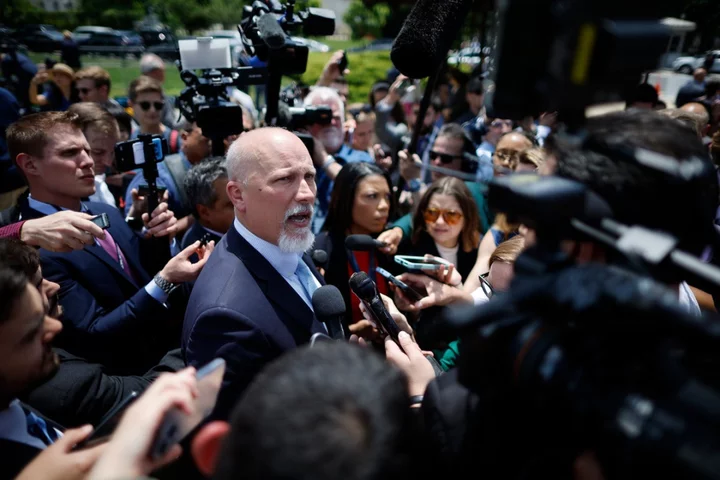
Debt limit agreement clears first hurdle despite Republican anger. Here’s what happens next
The bipartisan agreement to raise the debt limit cleared a key hurdle on Tuesday evening despite vehement criticism from many House Republicans. The House Rules Committee voted 7-6 to advance the legislation that codifies the bipartisan agreement struck between House Speaker Kevin McCarthy’s team and negotiators from President Joe Biden’s administration. The rule will now go to the full House floor before the agreement comes to a full House vote. The rule passed after an hours-long deliberation in the committee that included multiple amendment proposals. The vote comes as Treasury Secretary Janet Yellen has warned that the United States will be unable to satisfy its debt obligations come 5 June. The House of Representatives is set to vote But many House Republicans raised objections, including members of the House Freedom Caucus who had previously opposed Mr McCarthy’s bid for speaker in January. Rep Andy Biggs (R - AZ) told The Independent that Mr McCarthy’s deal with the White House was a repeat of his past behaviour. “When he was been in leadership for 13 years, it was not uncommon for him to be the point man to go negotiate a spending cap deal with the Democrats,” he said. Many Republicans criticised the fact that the legislation keeps in place Mr Biden’s student loan forgiveness, only claws back a small sliver of money meant to increase funding for the Internal Revenue Service and raises the debt limit until January 2025, after the 2024 presidential election. Rep Bob Good (R - VA) told The Independent that the bill symbolised a surrender from House Republican leadership. “We have literally come together and our leadership and their leadership and agreed on a Democrat bill,” Mr Good told The Independent. But many allies of Mr McCarthy also opposed the legislation. Rep Nancy Mace (R - SC), who voted for Mr McCarthy for speaker in January, announced her opposition to the bill. “Washington is, was and always will be lousy at responsibly spending your tax dollars,” she tweeted. “That won’t change unless we demand change.” Rep Chip Roy (R - TX) refuted the idea that conservatives would want the United States to default on its debt obligations. “The only person who would default in this town is Joe Biden unless Republicans default on the American dream by voting for this bad bill,” he said at a press conference. “That is why this group will oppose it, we will continue to fight it, today, tomorrow, and no matter what happens, there’s going to be a reckoning about what just occurred.” Mr Roy had tweeted on Monday that during the negotiations for the speakership, Republican leaders pledged that nothing would pass the Rules Committee without at least seven Republican votes and the committee would not allow for reporting out rules without unanimous Republican votes. During the negotiations, Mr Roy tried to stress his opposition and said why Republicans should oppose the bill. “We're not going to reduce spending through this deal. Unless we actually stand up and reduce spending it'll be on us to choose to,” he said during the hearing. “But this deal isn't going to reduce spending even though everybody's going around saying it will.” But some Republicans stressed that the agreement was the only one that could pass the House and Senate and end up on the president’s desk. “We only control one-half of one-third of government,” Rep Erin Houchin (R - IN) said. “There’s no better deal to be had.” Mr McCarthy expressed confidence in a press conference that he would have enough votes to raise the debt limit. “I’m not sure what in the bill people are concerned about,” he told reporters, saying it is the largest savings in congressional history. “We’re pulling money back for the hard-working taxpayers that are going to China. Are they opposed to work requirements for welfare?” On the Senate side, both Republican and Democratic leaders praised the agreement. “Congress will vote on legislation that locks in that important progress,” Senate Minority Leader Mitch McConnell (R - KY) said in remarks on the Senate floor. “Republicans have a tremendous opportunity to take on an existential challenge facing our economy and future generations of Americans. We have a chance to start bringing Washington Democrats’ reckless spending to heel.” Senate Majority Leader Chuck Schumer said the bill was a reasonable compromise. “Of course, nobody is getting everything they want – there is give on both sides – but this agreement is the responsible, prudent and very necessary way forward,” he said on the Senate floor. Mr Schumer said he would bring the bill up as quickly as possible for consideration before the default deadline on 5 June. Read More Biden ‘optimistic’ about McCarthy negotiations as AOC slams ‘dysfunctional’ debt ceiling system Debt ceiling deal reached between Biden and McCarthy Conservatives bark after the debt limit deal. Will they actually bite McCarthy? GOP chairman moves to hold FBI director Wray in contempt over Biden doc Utah Republican Chris Stewart planning to resign from Congress, AP source says Debt limit deal is in place, but budget deficit is still a multi-decade challenge for US government
2023-05-31 09:25

Elizabeth Holmes news – latest: Theranos founder surrenders to Texas prison to begin 11-year sentence
Elizabeth Holmes has reported to prison today to begin her 11-year sentence for the blood-testing scam at the heart of her start-up, Theranos. Wearing a beige sweater, jeans and sneakers, Elizabeth Holmes was directed into Federal Prison Camp in Bryan, Texas, by staff from the Federal Bureau of Prisons just minutes before a court-imposed deadline of 2pm on Tuesday. A federal appeals court rejected her bid to remain out of prison earlier this month while she attempts to overturn her January 2022 conviction on four felony counts of fraud and conspiracy. A delay was granted to give Holmes time to sort out several issues, including child care for her one-year-old son William and three-month-old daughter Invicta. Holmes had originally been ordered to begin her prison sentence on 27 April. The father of both children is William “Billy” Evans, whom she met after breaking up with her former romantic and business partner, Ramesh “Sunny,” Balwani, who began serving a nearly 13-year prison sentence last month in Southern California. Holmes spent the Memorial Day weekend near her home in San Diego before surrendering to authorities on 30 May. Read More Elizabeth Holmes surrenders to federal prison in Texas to begin 11-year sentence for Theranos scandal Elizabeth Holmes prison: Everything we know about disgraced Theranos founder going to jail Who is Billy Evans, the husband of Theranos founder Elizabeth Holmes? Camp Bryan: What do we know about the prison holding Elizabeth Holmes? Selfless visionary or scheming grifter? Theranos founder Elizabeth Holmes sentenced to 11 years in prison
2023-05-31 02:15

Elizabeth Holmes surrenders to federal prison in Texas to begin 11-year sentence for Theranos scandal
Elizabeth Holmes has surrendered to a federal prison in Texas to begin her 11-year sentence over the Theranos scandal which rocked the high-flying tech world of Silicon Valley. The 39-year-old disgraced tech entrepreneur reported to Bryan, the minimum-security federal prison camp in Texas, on Tuesday after exhausting all remaining legal avenues to cling onto her freedom. Holmes was convicted in January 2022 of four counts of fraud and conspiracy for lying about the capabilities pf her biotech company’s blood testing technology and conning investors out of millions of dollars. She was sentenced to 11 years and three months in prison and ordered to pay $452m in restitution to investors – including $125m to media mogul Rupert Murdoch. Holmes had been given until 2pm local time to surrender to the prison camp where she will see out her 11-year sentence surrounded by other white-collar, non-violent female offenders. Her two children – two-year-old William and three-month-old Invicta – will be allowed to visit their mother in the facility. The prison camp, which runs a work-focused program where all inmates are required to hold a job for at least 90 days, is a marked difference from Holmes’ life years earlier when she was seen as the darling of Silicon Valley. The saga began two decades ago when Holmes dropped out of Stanford University in 2003 at the age of 19 to found Theranos. The blood lab company aimed to develop medical devices that could diagnose hundreds of diseases and medical conditions with just a pinprick of blood. Over the next 10 years, Theranos boasted about its capabilities to transform the healthcare industry and grew to a value of $9bn, attracting investments from the likes of Murdoch, former Education Secretary Betsy DeVos and the heirs to the Walmart fortune. The company amassed an influential board of directors including former presidential cabinet members George Shultz, Henry Kissinger and James Mattis. Holmes, meanwhile, was catapulted onto magazine covers and became heralded as the next Steve Jobs while her personal fortune reached $4.5bn. But the technology didn’t do close to what Holmes claimed it could. In 2018, Holmes – Theranos CEO and founder – and Ramesh “Sunny” Balwani – Theranos chief operating officer and Holmes’ live-in romantic partner – were both indicted on fraud charges and the company was dissolved. She was allowed out on bail and while awaiting trial – which was stalled due to the Covid-19 pandemic – Holmes became pregnant with her first child with her partner, hotel boss Billy Evans. She became pregnant with her second child following her conviction. During her trial, Holmes sought to paint a picture that she had simply been under the control of Balwani, 57, and that she never intended to mislead investors about the technology’s capabilities. The jury didn’t buy it and she was convicted of four counts, which could have landed her with up to 20 years’ prison time. Balwani was also convicted of 12 counts of fraud and conspiracy at his trial and was sentenced to 13 years in federal prison. He began serving his sentence in Southern California last month. Since her conviction, Holmes has fought to stay out of prison claiming that she was treated unfairly by prosecutors during trial and that she should be allowed to remain out of prison while she appeals the conviction. An appeals court denied her request and said she must report to prison where she can continue to appeal her conviction behind bars. She asked the judge that she be allowed to remain free through Memorial Day weekend so that she could sort out childcare for her two children, before surrendering to authorities on 30 May. Weeks before beginning her sentence, Holmes admitted that she had made “many mistakes” in a new interview with The New York Times. “I made so many mistakes and there was so much I didn’t know and understand, and I feel like when you do it wrong, it’s like you really internalise it in a deep way,” she said. Read More Elizabeth Holmes news – latest: Theranos founder to surrender to Texas prison today to begin 11-year sentence As Elizabeth Holmes heads to prison for fraud, questions remain about her motives Elizabeth Holmes requests May 30 as new date to report to prison after losing her bid to remain free
2023-05-31 01:57

Elizabeth Holmes prison: Everything we know about disgraced Theranos founder going to jail
Disgraced Theranos founder Elizabeth Holmes is about to begin her 11-year prison sentence after being found guilty of defrauding investors, including media mogul Rupert Murdoch, over fake claims about the company’s blood-testing capabilities. As well as being handed jail time over her role in misleading investors, Holmes was also ordered to pay $452m in restitution. Follow the latest updates live “This is a fraud case where an exciting venture went forward with great expectations and hope, only to be dashed by untruth, misrepresentations, hubris, and plain lies,” Judge Davila, presiding over the case, said before handing down the prison sentence to Holmes. “I suppose we step back and we look at this, and we think, what is the pathology of fraud? Is it the inability or the refusal to accept responsibility or express contrition in any way? Now, perhaps that is the cautionary tale that will go forward from this case.” Ahead of being sentenced, Holmes, who has long maintained she did not intend to defraud anyone, told the court: “I am devastated by my failings. “Every day for the past years I have felt deep pain for what people went through because I failed them. I regret my failings with every cell of my body.” Where will Holmes serve her sentence Holmes, who requested 18 months of house arrest as a punishment, will begin her sentence at Federal Prison Camp Bryan in Texas – an all-female facility 100 miles from Holmes’ hometown. The minimum security prison houses around 500 inmates, and runs a variety of programmes intended to prepare prisoners for life after incarceration, according to Camp Bryan’s handbook. Holmes’ day will begin at 6am, when inmates are woken up for meals and work; people failing to comply with the strict wakeup rules are subject to punishments. Inmates are then counted at five different times during the day, when they must assemble in specific areas (once again, punishments are doled out to those who are not present at these times). The prison features a study, game room, and work programmes that see all inmates take part in a six-week course on the importance of efficiency in the workplace before they are placed into a role – with some prisoners earning as little as $0.12 in some assignments. According to the handbook, “All designated inmates are required to develop a financial plan to meet their financial obligations”, which for Holmes will mean reparations of $452m. How will Holmes keep in touch with her family? Holmes is married to Billy Evans, and the pair have two children, William, 2, and newborn Invicta. She lives around 100 miles from her family, who will be permitted to visit at weekends. Inmates at Camp Bryan are also permitted to take part in video sessions with their friends and family, according to the handbook, as well as to send and receive text messages. Prior to beginning her sentence at Camp Bryan, Holmes spent the weekend with her husband and children at the beach.
2023-05-30 22:27
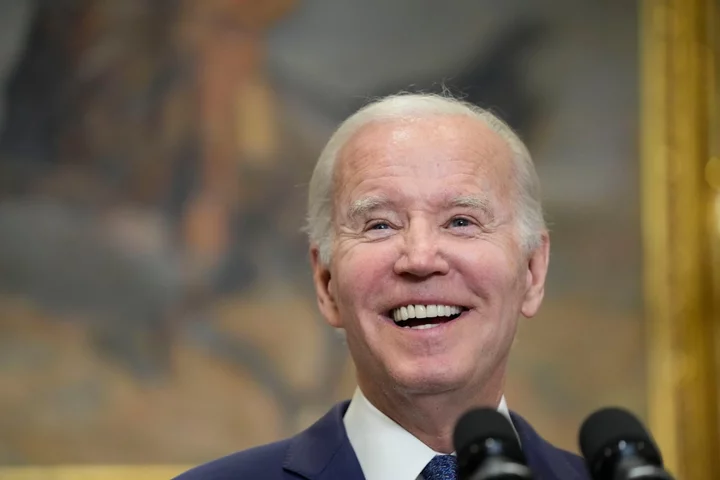
Takeaways on debt ceiling: McCarthy's balancing act, Biden's choice and the challenges ahead
It’s a deal no one in Washington claims to really like. But after weeks of negotiations, President Joe Biden and House Speaker Kevin McCarthy have struck an agreement to raise the debt ceiling and avert a potentially devastating government default. The stakes are high for both men — and now each will have to persuade lawmakers in their parties to vote for it. Treasury Secretary Janet Yellen said last week that the United States could run out of cash to pay the bills and default on its obligations if the debt ceiling is not raised by June 5. The ultimate agreement, hammered out by Biden, McCarthy and a small group of their deputies, is a two-year budget deal that would essentially hold spending flat for 2024, while boosting it for defense and veterans, and capping increases at 1% for 2025. It would suspend the debt limit until January 2025, after the next presidential election. Republicans had insisted on reducing spending and had passed their own bill with much larger cuts last month. The package would also make policy tweaks, including by adding work requirements for some food aid recipients and streamlining an environmental law that Republicans say has made it harder to build energy projects. Takeaways from the deal, and from the negotiations that led up to it: McCARTHY’S DELICATE BALANCING ACT Ever since McCarthy won the House speakership on the 15th ballot in January, it was clear that the debt ceiling negotiations would be his first and perhaps biggest test. Known more for strategy than policy, McCarthy has had a challenge that seemed almost insurmountable, with a narrow majority and a sizable group of hard-right conservatives certain to oppose anything he negotiated with Biden. And he could still find himself in the middle of a crisis if too many in his caucus revolt when the House votes on the package this week. Through it all, the Californian has exhibited his typical laid-back vibe, projecting confidence about the bill and its success. He said Sunday that he will win a majority of Republicans on the bill and some Democrats. In a conference call on Saturday night, McCarthy said, more than 95 percent of the members in his conference “were overwhelmingly excited about what they see.” But some House Republicans were publicly slamming the deal, arguing it did too little to cut the deficit. Rep. Dan Bishop of North Carolina tweeted a vomit emoji, complaining that some Republicans on the call were praising the speaker for getting what he said is “almost zippo in exchange” for the debt-ceiling hike. BIDEN’S RELUCTANT COMPROMISE For months, Biden and his aides had a mantra: There would be no negotiation on the debt limit. But then he negotiated anyway. It’s not where Biden, a veteran of the nasty 2011 debt-limit battle that saw the nation’s credit rating downgraded for the first time in history, wanted to be. But it was a likely scenario — with a Republican-controlled House that had made it clear from the start that it would not raise the borrowing authority under a Democratic president without extracting spending curbs or other policy concessions. There was no way Biden, who is running for re-election next year, would want a historic default on his watch. Biden has continued to insist that he was negotiating on the budget, not the debt ceiling. But pushed by a reporter Sunday evening who noted that was precisely what Republicans were seeking in exchange for lifting the debt limit, the president seemed to break from his talking point. “Sure, yeah,” Biden said, chuckling slightly. “Can you think of an alternative?” Now he will have to sell it to House Democrats, who must vote for it in big enough numbers to make up for defecting Republicans. Many progressive members in the House have appeared skeptical of the deal, but they remained mostly quiet over the weekend as they waited for more details. But the deal won early praise from another key Democratic group. The New Democrat Coalition, which has roughly 100 members, praised Biden as having negotiated “a viable, bipartisan solution to end this crisis.” LONG-SOUGHT GOP POLICY Republicans were able to win some policy changes they have sought for years, however modest, including on food aid. The bill would raise the age limit for existing work requirements in the Supplemental Nutrition Assistance Program, also known as food stamps. It would also create a new agency to develop and streamline environmental reviews that Republicans have complained about for decades. The new work requirements for able-bodied SNAP recipients without dependents would phase in by 2025 and expire by 2030. And a provision pushed by Biden would take some vulnerable recipients — like veterans and the homeless — off work requirements entirely. But Republicans made clear that pushing more people to work in exchange for government benefits was a major victory for them, even if mostly symbolic. The bill also would amend the National Environmental Policy Act and designate “a single lead agency” to develop environmental reviews, in hopes of streamlining the process. Republicans had hoped for a much broader permitting package that would make it easier to build and develop energy projects. But Louisiana Rep. Garret Graves, a McCarthy ally who was one of the negotiators, said the bill brings “transformational changes into the permitting and environmental review process” for the first time in four decades. SENATE QUIET, WAITING TO CLOSE McCarthy has said the House will vote on the package Wednesday. If passed, it will then head to the Democratic-led Senate where leaders will have to get agreement from all 100 members to speed up the process and avert a default by next Monday. The White House briefed Democratic senators Sunday and McCarthy briefed Republicans. But most senators remained quiet on the deal as they waited for the full text and to see if McCarthy can navigate it through the House. Senate Majority Leader Chuck Schumer, D-N.Y., and Senate Republican Leader Mitch McConnell of Kentucky cut themselves out of the negotiating process early on, saying it should be a negotiation between the White House and McCarthy. McConnell issued a statement supporting the legislation on Sunday but some in his caucus have criticized it. The two leaders will have to navigate any potential objections over the coming week as they seek to win full support to move quickly on the deal. “With Republicans like these, who needs Democrats?” tweeted Utah Sen. Mike Lee on Saturday, aligning himself with the House Republicans who say the deal is not conservative enough. Read More Ukraine war’s heaviest fight rages in east - follow live Charity boss speaks out over ‘traumatic’ encounter with royal aide Trump's welcome of Scott into 2024 race shows his calculus: The more GOP rivals, the better for him Stock market today: Asian markets mostly higher after Biden-McCarthy deal on US debt What’s in the cliffhanger deal struck by Biden and McCarthy to raise the debt limit?
2023-05-29 12:49
